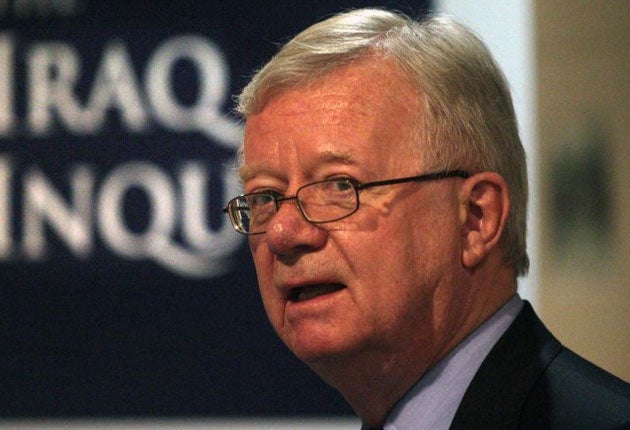Labour put limits on Iraq Inquiry to keep the US happy

Your support helps us to tell the story
From reproductive rights to climate change to Big Tech, The Independent is on the ground when the story is developing. Whether it's investigating the financials of Elon Musk's pro-Trump PAC or producing our latest documentary, 'The A Word', which shines a light on the American women fighting for reproductive rights, we know how important it is to parse out the facts from the messaging.
At such a critical moment in US history, we need reporters on the ground. Your donation allows us to keep sending journalists to speak to both sides of the story.
The Independent is trusted by Americans across the entire political spectrum. And unlike many other quality news outlets, we choose not to lock Americans out of our reporting and analysis with paywalls. We believe quality journalism should be available to everyone, paid for by those who can afford it.
Your support makes all the difference.Gordon Brown's Government secretly promised to limit the extent of the Iraq war inquiry to prevent damage to the United States, the leaked cables disclosed. The pledge – made last September as the Chilcot inquiry into the war started – threatens to damage the credibility of the investigation, which is due to report in the new year.
A message from Jon Day, then director-general for security at the Ministry of Defence, reassured American officials that "the UK had put measures in place to protect [US] interests during the UK inquiry into the causes of the Iraq war".
A separate document makes clear that Sir John Chilcot, who is chairing the investigation, felt his inquiries were being hampered. He expressed "frustration" that he was unable to refer to relevant documents during his questioning of Lord Goldsmith, the former Attorney General. British officials also warned the US there would be a "feeding frenzy" of interest in the UK about the inquiry, in contrast to the US, where the Iraq war was "no longer a major issue".
The disclosures will fuel charges that the inquiry, which has already heard evidence from Mr Brown and Tony Blair, is being constrained in its ability to gain the full intelligence picture. Originally, Mr Brown wanted the evidence to be heard in private, but he was forced to back down in the face of public and political anger. He had promised that the inquiry team would have full access to all the relevant intelligence material that did not jeopardise national security. But additional restrictions were imposed, including any disclosure of information that undermined Britain's economic interests.
There are also restrictions on data protection concerns, commercial sensitivities and fears that an individual's safety could be put in peril.
The move provoked fury, with Nick Clegg, who is now the Deputy Prime Minister, claiming that the inquiry had been "gagged". In angry Commons clashes, the Liberal Democrat leader protested that the list of restrictions "outrageously gives Whitehall departments individual rights of veto".
Other cables show that Cynthia Stroum, the US ambassador to Luxembourg, secretly praised Moazzam Begg, the British man locked up for three years in Guantanamo Bay on accusations of terrorism. Since his release in 2005, he has campaigned for other European countries to give homes to Guantanamo Bay detainees.
Ms Stroum wrote after Mr Begg visited the country in January: "It is ironic that after four years of imprisonment and alleged torture, Moazzam Begg is delivering the same démarche to GOL [the government of Luxembourg] as we are: 'please consider accepting... detainees for resettlement'."
She added: "Rather than stressing past injustices, he focused on what to do now."
Join our commenting forum
Join thought-provoking conversations, follow other Independent readers and see their replies
Comments